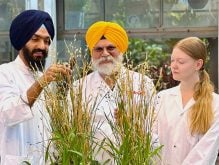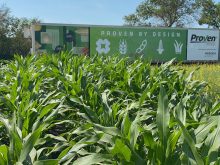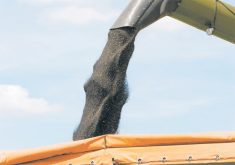Seed development companies want to see more ability to collect royalties than what is currently available in some crops
Glacier FarmMedia – Canada has difficulty attracting companies to develop crop varieties due to the amount of farm-saved seed used by growers.
As countries try to establish themselves as suitable places for development of gene-edited crops, there are questions about Canada’s ability to be a player.
Gene editing can help with production challenges with many crops, but local capacity is needed to solve regional problems.
Read Also

Farming Smarter receives financial boost from Alberta government for potato research
Farming Smarter near Lethbridge got a boost to its research equipment, thanks to the Alberta government’s increase in funding for research associations.
Canadian guidance on gene-edited crops was announced in April.
“It’s great news that we finally have the guidance through and I think it’s very positive,” said Ellen Sparry, president of Seeds Canada and general manager of C&M Seeds, in an interview at the World Seed Congress in the Netherlands.
An Alberta wheat breeder at Agriculture Canada announced greenhouse tests of gene-edited wheat with drought tolerance shortly after the federal government released its guidance on gene editing.
“I was surprised, so I think it’s going to go a lot quicker than what we envision,” said Sparry, adding that she knows of another product submitted to CFIA that was on hold pending release of the regulations.
“The next question is, how many of them are on hold within the office? And how long is it going to take to clear those approvals?”
Private seed companies like to see a market from which they can recoup costs. That has resulted in less variety development in Western Canada, where royalties don’t have to be paid on saved seed, which farmers often use. That may have implications for the development of gene-editing infrastructure in Canada.
There are ways to capture farm-saved seed royalties, but use is controversial and not yet widespread.
Sparry said a trait would have to have enough value that farmers would be willing to pay a royalty for the seed.
“I don’t know how it’s going to evolve. I mean, we’re still pretty low on certified seed. My concern is, are we going to attract those companies to Canada based on their ability to capture return on their investment?”
Sparry said more small and medium-sized breeding companies are expected to enter the gene-editing game, and there are more companies of that size in Quebec.
It’s been three years since the merger of four seed sector organizations into Seeds Canada and Sparry said the organization is functioning well.
She is the founding president and said she’s in her last year in that position. The merger brought together the Canadian Seed Trade Association, the Canadian Plant Technology Agency, the Commercial Seed Analysts Association of Canada and the Canadian Seed Institute in 2021.
The Canadian Seed Growers Association voted not to join Seeds Canada and continues to function on its own.
Sparry said about half of staff time has been spent on national seed regulation modernization, a large project undertaken by the Canadian Food Inspection Agency to open the regulations and learn what the seeds sector needs for the future. Members have also spent time on the regulations.
CFIA’s task forces have made 140 recommendations to the CFIA on seed modernization, including a request for an independent advisory body that can help make changes quicker than the time-consuming current update of the decades-old regulations.
“So the question is, has CFIA been given all they need to make the required changes we need to take Canada forward?” said Sparry.


















